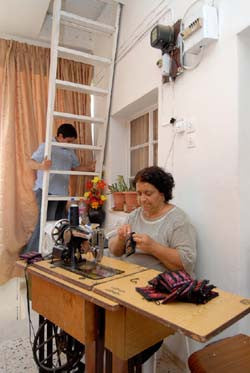Melkite Pastoral Centre
 Location: Ramallah, West Bank
Location: Ramallah, West Bank
Beneficiaries: 200 women from 8 villages

The Melkite Pastoral Centre was established in 1988 in the city of Ramallah by the sisters of Greek Catholic (Melkite) Church Centre.
Working with women from villages around Ramallah, the Melkite Church provides fabric and thread for women to embroider, in exchange for a salary. The products are inspired by traditional designs that decorate Palestinian women’s dresses, and symbolically represent the hills, trees, and flowers of the country.
The villages suffer from high unemployment, poor infrastructure and a lack of social services, and the women’s income from the embroidery work means that families can afford schooling for their children, medicine for the elderly, and daily needs such as food and clothing.
View our product range from the Melkite Pastoral Centre here >>
These products are certified Fair Trade: creating opportunities for disadvantaged producers, sustaining fair working conditions and wages, empowering women, and preserving traditional crafts and artisan skills.
Cross-stitch embroidery in Palestine
Once a traditional craft practiced by village women, Palestinian cross-stitch embroidery has become an important symbol of Palestinian culture. Embroidered pieces can be found in the homes of most Palestinian families in the West Bank, Gaza Strip, Israel and the Diaspora beyond, adorning the walls of houses in Jerusalem, villas in the Gulf, suburban homes in the United States, and cement block houses in refugee camps. In addition, cross-stitch embroidery is given as gifts and worn by Palestinians worldwide on festive occasions.
The popularity of embroidery springs from both its beauty and its association with the Palestine of the past. Common patterns reflect the millennia-long history of the land. The designs are derived from sources as diverse as ancient mythology and foreign occupations and date as far back as the Canaanites, who lived in the area over three thousand years ago.
The handicraft also symbolises the traditional rural lifestyle of Palestine, much of which was lost after the 1948 creation of the state of Israel. Embroidery was the principal decoration of rural women's clothing. It was part of a village women's daily routine and a means of showing off her personal skills and social identity. The patterns, colours and quality of the dress reflected a woman's social standing, marital status and wealth.
Although the Palestinian cultural landscape has changed dramatically in the last fifty years, cross-stitch embroidery has remained a vibrant handicraft because, for many Palestinians, it is a familiar reminder of Palestine in the days of their grandparents or great-grandparents.

